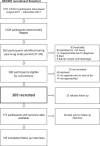Recurrent delirium over 12 months predicts dementia: results of the Delirium and Cognitive Impact in Dementia (DECIDE) study
- PMID: 33320945
- PMCID: PMC8099011
- DOI: 10.1093/ageing/afaa244
Recurrent delirium over 12 months predicts dementia: results of the Delirium and Cognitive Impact in Dementia (DECIDE) study
Abstract
Background: Delirium is common, distressing and associated with poor outcomes. Previous studies investigating the impact of delirium on cognitive outcomes have been limited by incomplete ascertainment of baseline cognition or lack of prospective delirium assessments. This study quantified the association between delirium and cognitive function over time by prospectively ascertaining delirium in a cohort aged ≥ 65 years in whom baseline cognition had previously been established.
Methods: For 12 months, we assessed participants from the Cognitive Function and Ageing Study II-Newcastle for delirium daily during hospital admissions. At 1-year, we assessed cognitive decline and dementia in those with and without delirium. We evaluated the effect of delirium (including its duration and number of episodes) on cognitive function over time, independently of baseline cognition and illness severity.
Results: Eighty two of 205 participants recruited developed delirium in hospital (40%). One-year outcome data were available for 173 participants: 18 had a new dementia diagnosis, 38 had died. Delirium was associated with cognitive decline (-1.8 Mini-Mental State Examination points [95% CI -3.5 to -0.2]) and an increased risk of new dementia diagnosis at follow up (OR 8.8 [95% CI 1.9-41.4]). More than one episode and more days with delirium (>5 days) were associated with worse cognitive outcomes.
Conclusions: Delirium increases risk of future cognitive decline and dementia, independent of illness severity and baseline cognition, with more episodes associated with worse cognitive outcomes. Given that delirium has been shown to be preventable in some cases, we propose that delirium is a potentially modifiable risk factor for dementia.
Keywords: cohort study; delirium; dementia; epidemiology; older people.
© The Author(s) 2020. Published by Oxford University Press on behalf of the British Geriatrics Society.
Figures
References
-
- Partridge JSL, Martin FC, Harari D, Dhesi JK. The delirium experience: what is the effect on patients, relatives and staff and what can be done to modify this? Int J Geriatr Psychiatry 2013; 28: 804–12. - PubMed
-
- Siddiqi N, House AO, Holmes JD. Occurrence and outcome of delirium in medical in-patients: a systematic literature review. Age Ageing 2006; 35: 350–64. - PubMed
-
- Witlox J, Eurelings LS, Jonghe JF, Kalisvaart KJ, Eikelenboom P, Gool WA. Delirium in elderly patients and the risk of postdischarge mortality, institutionalization, and dementia: a meta-analysis. JAMA 2010; 304: 443–51. - PubMed
-
- Jackson JC, Gordon SM, Hart RP, Hopkins RO, Ely EW. The association between delirium and cognitive decline: a review of the empirical literature. Neuropsychol Rev 2004; 14: 87–98. - PubMed
Publication types
MeSH terms
Grants and funding
LinkOut - more resources
Full Text Sources
Medical


